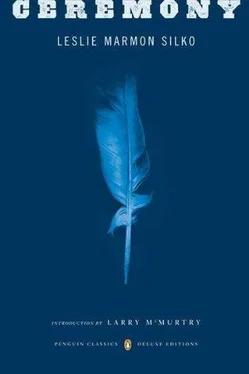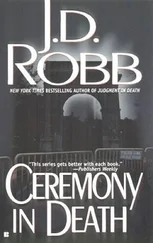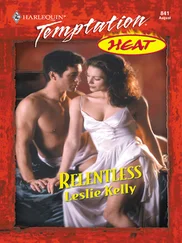The gusting winds had turned the sky dusty red. After two or three hours Harley pulled his hat low over his eyes to keep it on; and he dozed off, with both arms out in front of him, holding the donkey’s neck, propping him up. The burro must have been able to feel the change in Harley’s grip on its neck when Harley dozed off because it would begin to drift, gradually, from the right side of the road to the middle hump of sand and weeds, where it lowered its head quickly to reach a mouthful of weeds but always kept moving, trying to keep Harley from noticing any change. It got to the left side of the road that way and walked along steadily, only long enough to fool Harley, then the burro left the road entirely and completed the wide turn it had been engineering for almost half an hour. Tayo watched the burro’s deliberate moves, but its stubbornness made it predictable, and every fifteen minutes Harley jerked the burro’s head sharply to the right, flicked its flanks with the horsehair quirt, and put them back on course again. So they traveled in wide arcs, moving gradually to the north. Tayo thought about animals then, horses and mules, and the way they drifted with the wind. Josiah said that only humans had to endure anything, because only humans resisted what they saw outside themselves. Animals did not resist. But they persisted, because they became part of the wind. “Inside, Tayo, inside the belly of the wind.” So they moved with the snow, became part of the snowstorm which drifted up against the trees and fences. And when they died, frozen solid against a fence, with the snow drifted around their heads? “Ah, Tayo,” Josiah said, “the wind convinced them they were the ice.” He wished Josiah were there, not forever like he had been wishing, but just long enough so Tayo could tell him how he’d been feeling lately, how he’d almost been convinced he was brittle red clay, slipping away with the wind, a little more each day.
The wind didn’t blow as hard up there as it did on the clay flats. Harley stopped at the top of the hill and took a piss. The burro chewed the dry tufts of grass as close to the gray shale as it could and strained against the reins to reach another sparse clump of grass. But the mule stood alert, its milky staring eyes wide open. They were the same — the mule and old Grandma, she sitting in the corner of the room in the wintertime by the potbelly stove, or the summertime on an apple crate under the elm tree; she was as blind as the gray mule and just as persistent. She never hesitated to tell them that Rocky had promised to buy her a kerosene stove with his Army pay, even after Tayo came home from the hospital and she knew the sound of Rocky’s name made him cry.
“Don’t cry, Tayo, don’t cry. You know he wanted me to have it. And he didn’t want you to cry.” So finally Auntie took forty dollars of the insurance money and sent Robert to town, and he brought home an old heater with an automatic thermostat, so that once it was lighted, all it needed was a barrel of fuel oil on the wooden rack outside. She ordered that kind because she didn’t want to impose on any of them to look after her stove for her. Last year, on the coldest day of the winter, when San José creek froze solid and Auntie had gone to the store and old Grandma was all alone, the fire in the wood stove went out. This story always made Auntie stop whatever she was doing then, to say, “Mama, the coals were still warm when we got home,” and old Grandma always pretended she didn’t hear this, and she continued on about the things Rocky was going to do for her. They all mourned Rocky that way, by slipping, lapsing into the plans he had for college and for his football career. It didn’t take Tayo long to see the accident of time and space: Rocky was the one who was alive, buying Grandma her heater with the round dial on the front; Rocky was there in the college game scores on the sports page of the Albuquerque Journal. It was him, Tayo, who had died, but somehow there had been a mistake with the corpses, and somehow his was still unburied.
He started to cry, and when Harley looked back at him he did not wipe the tears away or pretend it was the dust and wind in his eyes. He was suddenly hollow; his fingers loosened and fell from the reins, slippery with sweat. The force of gravity seemed to surge up at him and pull him down. He hung with both arms to the mule’s neck, but he was caught and being dragged away. Rolling end over end in a flash flood in a big arroyo. After his hands slipped loose, his knees hit muddy ruts and there was screaming and the sound of bone crushing, hollow white skull bone beaten to bayonet edges by the jungle rain. The flood water was the color of the earth, of their skin, of the blood, his blood dried brown in the bandages.
Harley helped him up; he brushed the sand and weeds from Tayo’s shirt and handed him his hat. He walked with him to the shade at the foot of the mesa. He hobbled the mule and tied a long rope to the burro and let them graze on the thin, bluish green leaves of salt bushes growing at the entrance to the canyon. The sand felt cool. He squeezed it in both fists until it made little rivulets between his fingers. Harley sat down beside him and wiped his face on the sleeve of his shirt.
“Sunstroke. They always warned me about it, Tayo. We should’ve stopped to rest sooner.” He looked at Tayo closely. “Are you okay?”
Tayo nodded. He wanted to make a joke about himself, say something like “Sunstroke hell, the wind blew me off,” but he didn’t have energy to move his lips, to even form the words. Beyond the shade everything shimmered in waves of heat and the wind. The cliffs across the little wash, the junipers growing among the big orange boulders, and the hazy pink sky were bright colors of a dream, and the longer Tayo stared at them, the more he knew he was going to be sick. So he scratched a hole in the dry sand beside him, and when the glare of that light finally blinded him, he turned to his right side and vomited into the hole.
When he got off the train at New Laguna, his legs were shaky and the sleeves of his coat smelled like puke, although he had tried to rinse out the coat in the washroom sink on the train. He didn’t want them to know how sick he had been, how all night he had leaned against the metal wall in the men’s room, feeling the layers of muscle in his belly growing thinner, until the heaving was finally a ripple and then a quiver.
But Auntie stared at him the way she always had, reaching inside him with her eyes, calling up the past as if it were his future too, as if things would always be the same for him. They both knew then she would keep him and take care of him all the months he would lie in a bed too weak to walk. This time she would keep him because he was all she had left. Many years ago she had taken him to conceal the shame of her younger sister. Now she stood over the bed and looked at him, and if he opened his eyes, he knew he would see her probing for new shame, the anticipation of what she might find swelling inside her. What would it be this time? She remembered what that old fool Josiah had done; it wasn’t any different from Little Sister and that white man. She had fiercely protected them from the gossip in the village. But she never let them forget what she had endured, all because of what they had done. That’s why Tayo knew she wouldn’t send him away to a veterans’ hospital.
He lay with his face in the pillow. She had always watched him more closely than Rocky, because Rocky had been her own son and it had been her duty to raise him. Those who measured life by counting the crosses would not count her sacrifices for Rocky the way they counted her sacrifices for her dead sister’s half-breed child. When Rocky died he became unassailable forever in his frame on top of her bureau; his death gave her new advantages with the people: she had given so much. But advantages wear out; she needed a new struggle, another opportunity to show those who might gossip that she had still another unfortunate burden which proved that, above all else, she was a Christian woman. That was how it would be; he figured it out the first afternoon he was home.
Читать дальше












